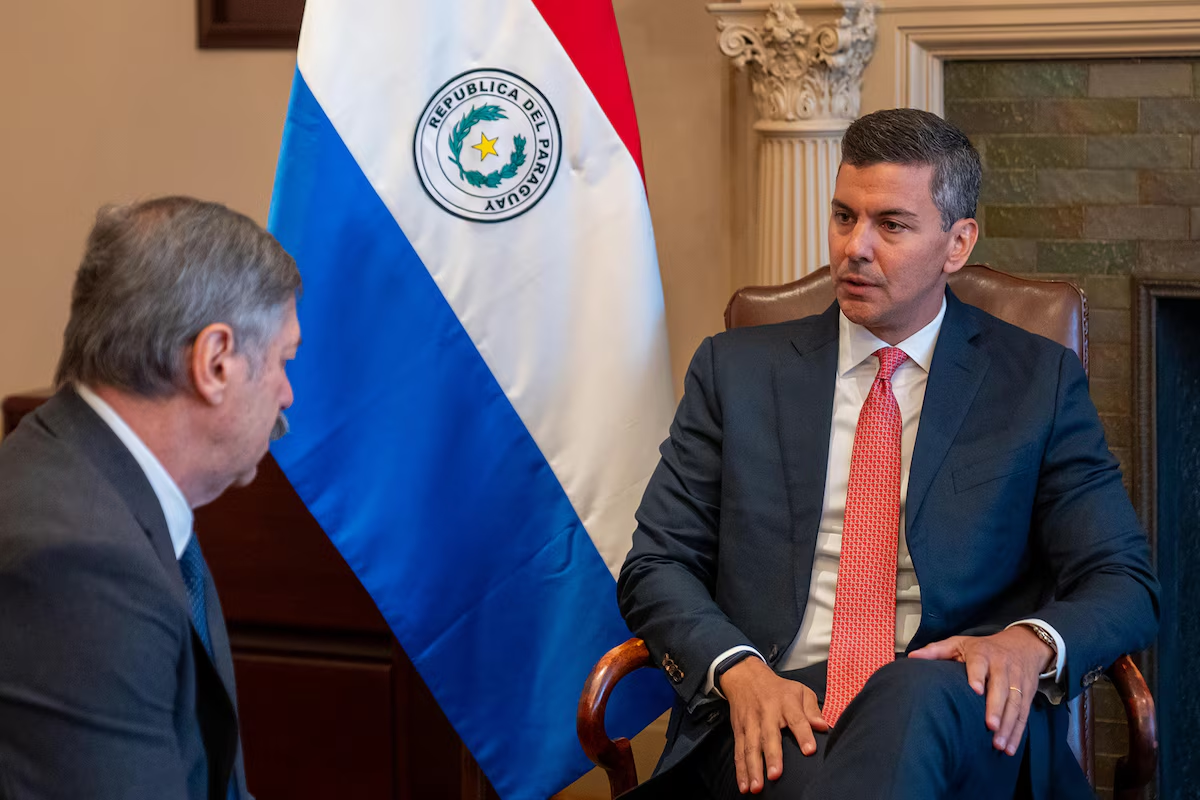Santiago Peña: Trump’s Presidency Could Be One of the Most Radical Shifts in Modern Latin American History
Santiago Peña, the President of Paraguay, welcomed guests with a warm smile at his country’s embassy in Dupont Circle, Washington, D.C. He was in the U.S. capital to attend Donald Trump’s inauguration—a ceremony he described as a turning point in 21st-century history. For Peña, Trump’s presidency holds the potential to resolve the conflict between Ukraine and Russia, ease tensions in the Middle East, and lead a strategic plan to restore democracy in Venezuela, Cuba, and Nicaragua.
“Trump could embody the biggest shift in U.S.-Latin American relations,” Peña said while sipping a hot coffee, gazing at the snowy streets outside. The cold weather even led Trump to move the ceremony from the Capitol’s steps to its historic Rotunda.
Peña has a critical stance on China’s growing influence in Latin America. He sees an opportunity to improve regional diplomacy and strongly supports his Foreign Minister, Rubén Ramírez, as a candidate for Secretary General of the Organization of American States (OAS). Ramírez, unlike his Caribbean rival—who leans toward China—maintains a firm position against Nicolás Maduro’s dictatorship in Venezuela.
“President Trump is aware that Paraguay is probably the strongest ally the U.S. has,” Peña emphasized when asked about diplomatic relations between Washington and Asunción. He revealed that he has spoken with Trump twice and found him highly attuned to Paraguay’s importance in regional affairs.
Radical Change for Latin America?
Asked if Trump’s presidency could alter U.S.-Latin American relations, Peña said, “I believe this could be one of the most radical changes in modern history for our region. Democratic administrations, like Biden’s, tend to focus less on Latin America, while Republican governments historically give us more attention.”
Peña cited the appointments of Marco Rubio as Secretary of State and Christian Landau as Deputy Secretary as promising signs. “Both have a deep understanding of Latin American culture, language, and the region’s potential, which will be crucial for facing the challenges ahead,” he added.
Peña believes Trump will act swiftly and decisively, especially in dealing with Venezuela, Cuba, and Nicaragua. “He knows he won’t have a second term, so he’ll move fast,” Peña explained, referencing recent negotiations that led to a long-sought agreement on Middle East hostages.
Standing Firm Against China
Peña highlighted Paraguay’s long-standing relationship with Taiwan as a critical element in countering China’s growing influence. “The U.S. has financed China’s economic growth for two decades, but now it’s time for fair competition. Paraguay supports trade that follows the rules,” he said.
He added that Paraguay is committed to becoming a member of the OECD and upholding high standards for labor, environmental protection, and the rule of law. These values, Peña argued, align perfectly with U.S. policies and strengthen Paraguay’s position as a strategic partner.
Trade and Regional Cooperation
On the question of a potential free trade agreement between Paraguay and the U.S., Peña said, “It’s not something we’ve pursued because we believe in negotiating as part of larger blocs like Mercosur.” However, he didn’t dismiss the idea entirely, noting that if the opportunity arose, he would consider it.
“Paraguay is not a migration or economic problem for the U.S. We are a major producer of clean energy, strategic minerals, and food. We also have a significant presence of U.S. companies,” Peña said, emphasizing the potential for a strong bilateral agenda.
OAS Leadership and U.S. Support
Peña confirmed Paraguay’s ongoing efforts to secure support for Rubén Ramírez’s candidacy as Secretary General of the OAS. While the Biden administration hadn’t formally pledged its vote, Peña expressed optimism. “Ramírez has the experience and leadership needed to revitalize the OAS,” he said.
He also pointed out the contrast between Ramírez and his main competitor from Suriname, who has a pro-China stance and avoids criticizing Maduro’s regime. “Marco Rubio’s appointment as Secretary of State strengthens our position since he has openly questioned China’s influence and Maduro’s dictatorship,” Peña concluded.






Leave a Reply